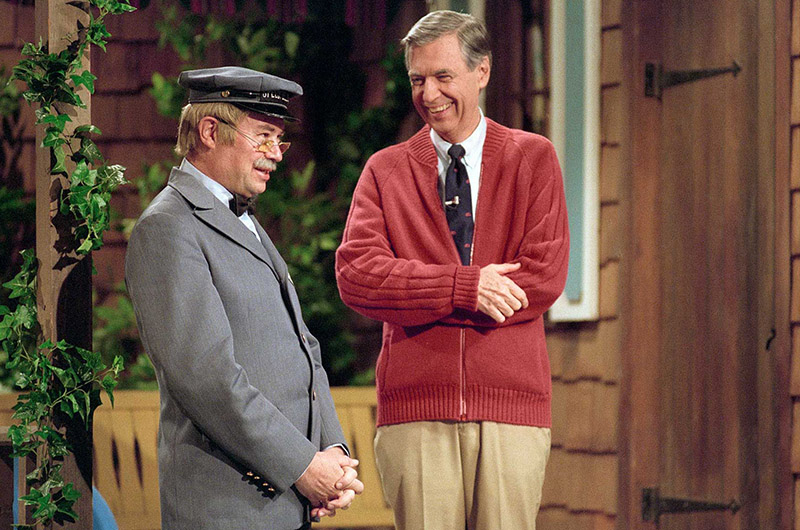There were some moments when documentary filmmaker Morgan Neville was on Martha’s Vineyard for an extended visit three years ago, when he felt a bit insecure about the subject of his next documentary.
He was here to accompany his film 20 Feet from Stardom, which won the Academy Award for Best Documentary, but he was already thinking a lot about his potential next project, a documentary about Mister Rogers.
“I kept asking people is it a crazy idea to make a film about Mister Rogers,” Mr. Neville said during an interview with the Gazette in Edgartown this week. “In a way you have to be vulnerable like Mister Rogers is vulnerable to put yourself out there to make a film as simple and deep as he was. What I found was every person I mentioned it to, reacted with such excitement and enthusiasm that I thought okay, I’m not crazy. Everybody just felt like this was a film for the moment.”
Film critics and audiences, including those who saw two showings of the documentary Won’t You Be My Neighbor at the Martha’s Vineyard Film Center this week, appear to be very happy that Mr. Neville’s insecurities vanished with the advice of his friends. The filmmaker appeared for a question and answer session with audiences following each screening.
The film is emotional. The sold-out Tuesday night audience reacted audibly to scene after scene of Mister Rogers interacting with kids. It explores an unseen side of Fred Rogers, with lots of archival footage of his programs, as well as footage away from the studio, including many scenes of Mister Rogers at his summer home on Nantucket.
The narrative follows his career, from a seminary student, through several iterations of his television program, and his advocacy for public television and quality programming for children.
Mr. Neville sees the film as an antidote of sorts for the current state of civil discourse, where division and lack of civility often rule the day. He wanted his film to show how Fred Rogers helped children to understand difficult sub jects, the good and bad of life, without rancor.
“I was somebody who grew up loving the show as a kid, then didn’t think about Mister Rogers for decades,” Mr. Neville said. “Every time I came across him as an adult, it struck me that this was a voice that I don’t hear in our culture any more. We’ve had a problem with civility for a while, it’s just reached an acute moment. The problem is there is no lobby for kindness and civility. In fact, most people are incentivized to be uncivil or disgraceful. Much of our media and much of our economics and most of our politics runs on playing against other people. It plays to our divisiveness, not our togetherness, neighborliness.”
Though they were few, Mister Rogers did have his critics. Some commentators criticized him for coddling young people through his program, for creating a generation of children who thought they were entitled. In the two years that it took to make the documentary, Mr. Neville came to believe that is a fundamental misinterpretation of Mister Rogers and his life’s work.
“Fred was acutely aware that television was this device that was raising generations of kids, and that many kids needed to hear those messages because they weren’t all going to get those at home,” Mr. Neville said. “In fact, I think it’s more about telling kids that they have some right to dignity, that they weren’t worthless. He wasn’t saying you’re entitled to worth, but I think we forget how many children aren’t told they are special. He was trying to be a voice that could offer that to children.”
Fred Rogers exhibited little pretense on his program for children, or in real life, according to those who knew him. But Mr. Neville said that in researching and making the film, he found a subject that was considerably more complex than his on screen persona.
“That’s kind of the essential question,” Mr. Neville said. “Is he for real? Fundamentally the answer is yes. He is who he seems, though I would say he’s a much deeper, more complicated version of the same character. I found lots of things that were surprising, but nothing that was shocking. The fact that he spoke many languages, and studied the world’s religions, and that he was a pacifist and a vegetarian. They all make sense when you think about who Fred Rogers is, but he was a more willful intellectual, deeper version of who the TV version was, and in a way, I think, more impressive than the TV character.”
In the film, one observer notes that everything Mister Rogers did was exactly the opposite of the assumed formula for success in a television program that would appeal to children. The sets and props were laughably imperfect, the actors and puppets were low-key, and there was no flashy music or slick production.
“The show was so simple,” said Mr. Neville. “We mistake simple for superficial. What he was doing was simple and deep. You have to pay attention to understand the depth of it. It’s what children do. When I think about how he talked, there is kind of an emotional directness that children have, that adults don’t have. We mask our intentions and hide our feelings and we’re not that openly vulnerable. Children are, and Fred was, which is what made him such an outlier as an adult, but made him so endearing to children.”
Won’t You Be My Neighbor will continue to screen throughout the weekend and next week. Visit mvfilmsociety.com for times and tickets.







Comments (5)
Comments
Comment policy »